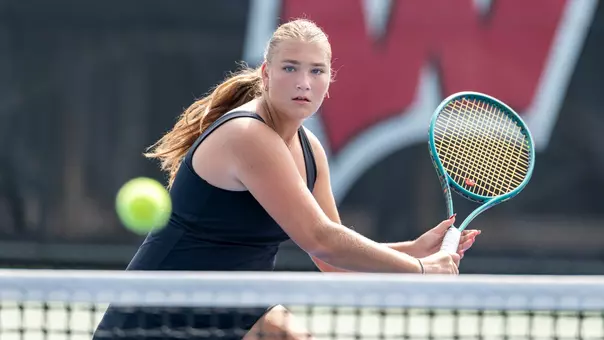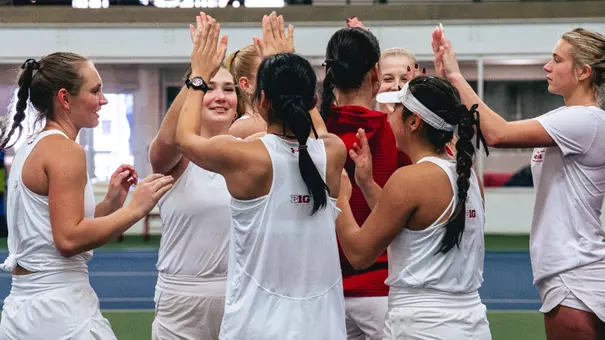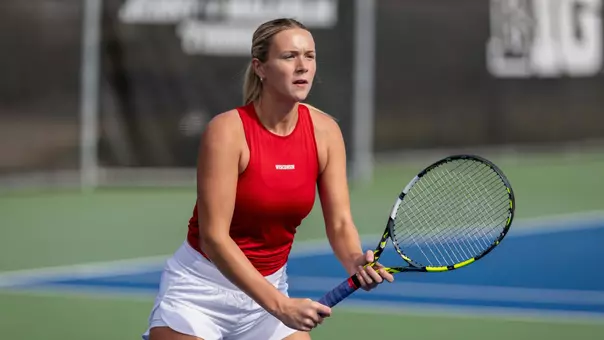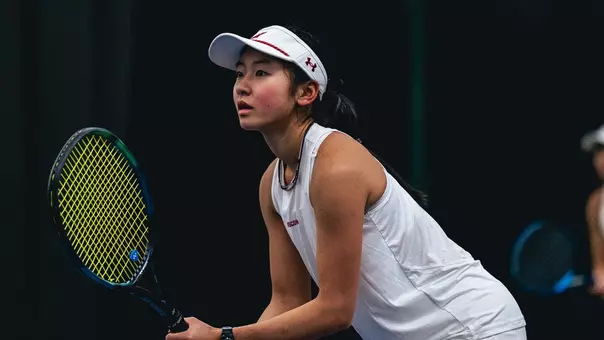
Baggot: Cai finds home and success at Wisconsin
October 04, 2021 | Women's Tennis
Cai earns exclusive opportunity at ITA Championships
BY ANDY BAGGOT
UWBadgers.com Insider
MADISON, Wis. — Long before Xinyu Cai became a mainstay for the Wisconsin women's tennis team, she routinely traveled the world alone.
Starting when she was 13, Cai left her home in Wuhan, China, to compete in places like Australia, Belgium, France and Spain. An only child, she sometimes stayed away for weeks, using daily FaceTime sessions to keep her parents, mother Junna Li and father Sheng Cai, up to date on her experiences.
So when Xinyu (pronounced Sin You) arrived in Madison and began her collegiate career with the Badgers in January of 2020, she was more than just an elite prospect who almost immediately became the No. 1 singles player for UW. She was also a mature, level-headed person with a unique skill set.
"She's an amazing human,'' Wisconsin coach Kelcy McKenna said of Cai.
McKenna spoke Sunday while traveling with Cai to the prestigious ITA All-American Championships in Charleston, South Carolina. The weeklong event, established in 1983, features the nation's top NCAA Division I players as determined by national and regional rankings.
Cai earned an invitation to the tournament after emerging as the top singles player for the Badgers last season, compiling a 12-6 record before her season was cut short by a leg injury.
Congrats to Xinyu on her @ITA_Tennis Preseason Singles Ranking!
— Wisconsin Tennis (@BadgerWTennis) September 14, 2021
ITA Rankings » https://t.co/papwJuBFJD pic.twitter.com/691ERnCxGl
"It's a pretty big honor just because on the women's side it's a very exclusive event,'' McKenna said.
Cai prepared for the tournament by securing practice time on the clay courts at the John Powless Tennis Center in Madison.
"It's a good opportunity,'' she said. "I'm really excited.''
The All-American Championships are a highlight for Cai, whose time at Wisconsin has been filled with extremes. Shortly after her arrival in Madison, the COVID pandemic engulfed the world, preventing many foreign students attending U.S. colleges from returning to their homes. Cai played one match for UW before the NCAA began shutting things down.
Cai spent 17 months on campus – from February of 2020 to June of 2021 – before she was able to return home and see her parents in person. Of course, when she got back to China she immediately had to quarantine for two weeks in a local hotel.
Cai alternately worried about her family – Wuhan is the global epicenter of the coronavirus – while wondering how to fill her days with worthwhile projects. She spent six months living in Room 321 of Smith Hall, the only inhabitant on the third floor.
That was OK during the spring semester because friends and teammates were still around and there was an academic routine to follow – Cai is majoring in communication arts – but things became weightier and lonelier when classes adjourned.
"It was really a tough mental challenge,'' Cai said. "It was really hard after the semester was finished. It was a very hard time to get through.''
McKenna organized weekly Zoom calls with her players and would join Cai for hitting sessions at Nielsen Tennis Stadium. McKenna also hosted Cai for Thanksgiving and Christmas and checked in on her regularly.
During those calls with her players, McKenna asked for book and movie suggestions that might entice Cai. McKenna also helped Cai tackle the task of obtaining her driver's license.
"Super helpful,'' is how Cai described the all-around effort from her coach and teammates.
Instead of feeling sorry for Cai, McKenna said she went about trying to find remedies that would maximize the experience.
"My brain gravitates toward finding solutions versus settling into a problem,'' she said.
There were days where Cai said she would walk to Madison West High School, located on the western edge of the UW campus, and hit balls off an outer wall.
There were days where Cai would take the bus to go shopping.
There were days where Cai and make her way to the Lake Mendota walking path and embrace the view and solitude.
Cai said she liked the advice she got from a UW sports psychologist, who said this was a period for inner reflection.
It helped Cai to know there were other foreign students facing the same challenges. Several became her friends.
Cai said being on her own at such a young age helped her manage her thoughts, schedule and attitude as a college student-athlete.
"It definitely helped a lot for me to learn to live my own life,'' she said. "I love having friends around, but I also love the time I spend by myself.''
Cai said she avoided contracting the coronavirus, but she fretted when she got word that her grandfather was infected.
"He's OK now,'' she said.
McKenna said Cai is uniquely qualified to negotiate such a challenging period.
"That's a testament to who she is,'' McKenna said. "She can thrive in chaos.''
Cai said she would FaceTime her mother, a teacher, and her father, a soccer instructor, every day. Her parents encouraged her to focus on training and her academics.
When Cai finally got home, she said it felt strange because so much of her time away had been spent immersed in social media instead of having regular human contact.
"I feel everything has changed, but nothing has changed,'' she said. "It's a weird feeling.''
How did the experience change Cai?
"I've become more appreciative of everything we have right now,'' she said.
"It gave her a fresh perspective,'' McKenna said.














